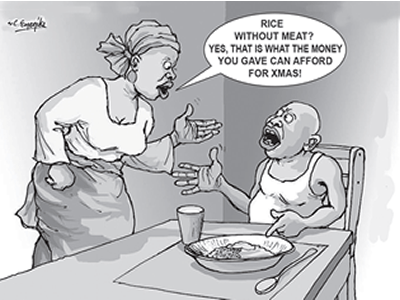
The recent increase in the salaries and allowances of personnel of Nigeria Police Force (NPF) has been greeted by wide jubilations in the Force and in many barracks and police formations across the country. Coming at a period when Nigerian policemen’s remuneration is comparatively very poor and inadequate, the raise gives them a big leap, closing in within acceptable spectrum all over the world.
Beyond the celebration, however, is the fact that the new remuneration already approved by President Muhammadu Buhari, which has taken effect from November 1, 2018, as contained in the correspondent to NPF from the National Salaries, Incomes and Wages Commission, must of necessity, boost the morale of officers and men of the Force, increase motivation and foster team cohesion. Contrary to prevalent lethargical police attitude, rampant corruption and lack of professionalism, which have made them the butt of every joke over the years, the officers and men must reciprocate with appropriate behavioural changes and enable the Force to regain its lost primacy in the nation’s criminal justice system and become a potent vehicle in internal security.
The pay rise, the second in the Force in the last 10 years, should have bigger impact and motivate them to eschew tardiness, unprofessional conduct, crass corruption and elicit in them unparalleled sense of patriotism and greater commitment to duty. With the new salary structure, we want to see the officers and men of the Force beam with operational efficiency, thorough and robust investigations and compilation of case files, diligent prosecution of cases in law courts and ultimately ennoble their profession by facilitating easy conviction of criminals in courts. Still in the area of operational efficiency, it should produce in the policemen the capacity and capability to respond more rapidly to distress calls, especially in the face of pulverizing internal security issues like pervasive kidnapping, cultism, violence, robbery, communal and religious crises in the country and ensure effective cooperation With the increase of the housing allowance of the IGP to N2.1 million, DIG N1.7 million, AIG N1.5 million, CP N1.3 million, DCP N531,000, ACP N483,000, SP N380,000, DSP N321,000, ASP N296,000 and Constables N84,000, representing about 100 per cent increase, the police have no alibi for extortion and ancillary corruption.
While we must acknowledge that the police have put in place an internal control mechanism, which has helped in instilling discipline in the Force, President Buhari captured the concomitant effect of the pay rise more succinctly when he said: “I am pleased to make the increase in salary and allowances in the hope that it will increase the performance index of the police and strengthen Nigeria’s internal security system. “The military should be reserved for higher tasks.
The police should be able to cope well with the challenges of armed robbery, kidnapping for ransom and such crimes. In every town and village, there is the presence of the police. From all these places, they should be able to forward first class intelligence to you on which to act.” Sadly, the previous pay rise carried out in 2009 failed to engender appropriate impact in the police, as they were never motivated to increase productivity.
Instead, many of them treat their duties with great neglect and lacklustre attitude, which had crippled our criminal justice system. This, therefore, is a striking reminder to police administrators that the psyche of the Nigerian policemen needs periodic re-orientation. Over the years, this attitude has been imbibed by new entrants, recruits and officers in the Force, thereby becoming protracted malaise. Adjunct to the pay rise is the need to ensure procurement of relevant operational equipment, vehicles, payment of monthly operational allowances and ensure regular power supply in the various police formations in the country.
Most of the formations are currently operating in inhuman offices, without power supply, appropriate furniture, crawling in rickety operational vehicles only to return to stinking and decrepit barracks. Similarly, the regular recruitments into the police in various parts of the country and the recent passing out of over 600 cadet graduates from the Police Academy, Kano, should be matched with corresponding provision of policing facilities and formations, to curb state commands’ over-dependence on state governments, community development associations and private organisations, thereby losing their impartiality.
It is also vital that adequate attention be given to manpower development of the officers and men in contemporary crime/ riot control and investigative strategies to make the nation more investment friendly and retard the current classification of the country as one of the most dangerous places to do business in the world.
As part of the broad strategy to turnaround the Force, the Police Service Commission should stop unjustified promotions of officers and men in the Force without requisite pre-promotion course. A notraining no promotion policy should return to the Force to ensure that beneficiaries of such promotion must acquire training to prepare them for their onerous responsibility. The task of repositioning the Force morally, operationally and strategically is now, especially ahead of the elections, to enthrone a 21st century Police Force capable of turning around the nation’s unimpressive internal security.
END

Be the first to comment